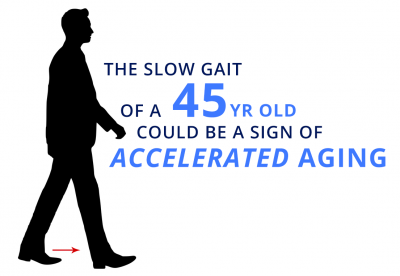Association of Neurocognitive and Physical Function With Gait Speed in Midlife

Gait speed (how fast you walk) is not only an indicator of your physical well-being but also an index of the health of your brain. These findings are based on the Dunedin Study, which has followed a birth cohort of 1,000 children born in the early 1970s to age 45 years. The findings, which appear on October 11 in JAMA Network Open, reveal that midlife adults with slower gait speed showed evidence of accelerated biological aging and greater declines in their cognitive functioning from childhood to midlife. A most remarkable finding was that we could predict how fast they walked at midlife by a childhood assessment of their neurocognitive functions at age 3. Measuring gait speed may be an effective way to evaluate new clinical trials that aim to slow aging. Gait speed could be used to measure the effect of such treatments on aging: the gait speed test is cheap, safe, easy to test repeatedly, and feasible to use among people in their 40s. Read full article here.